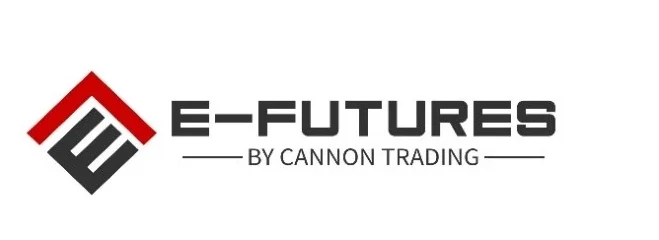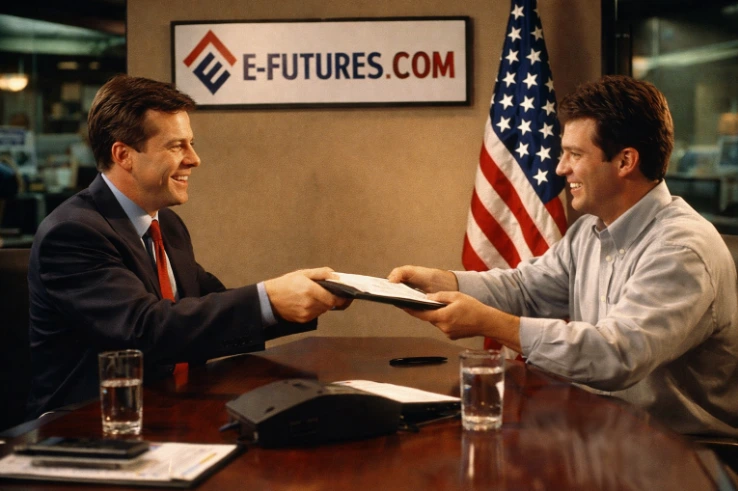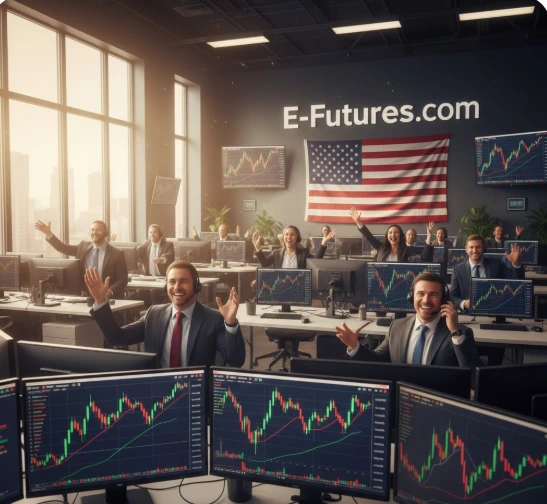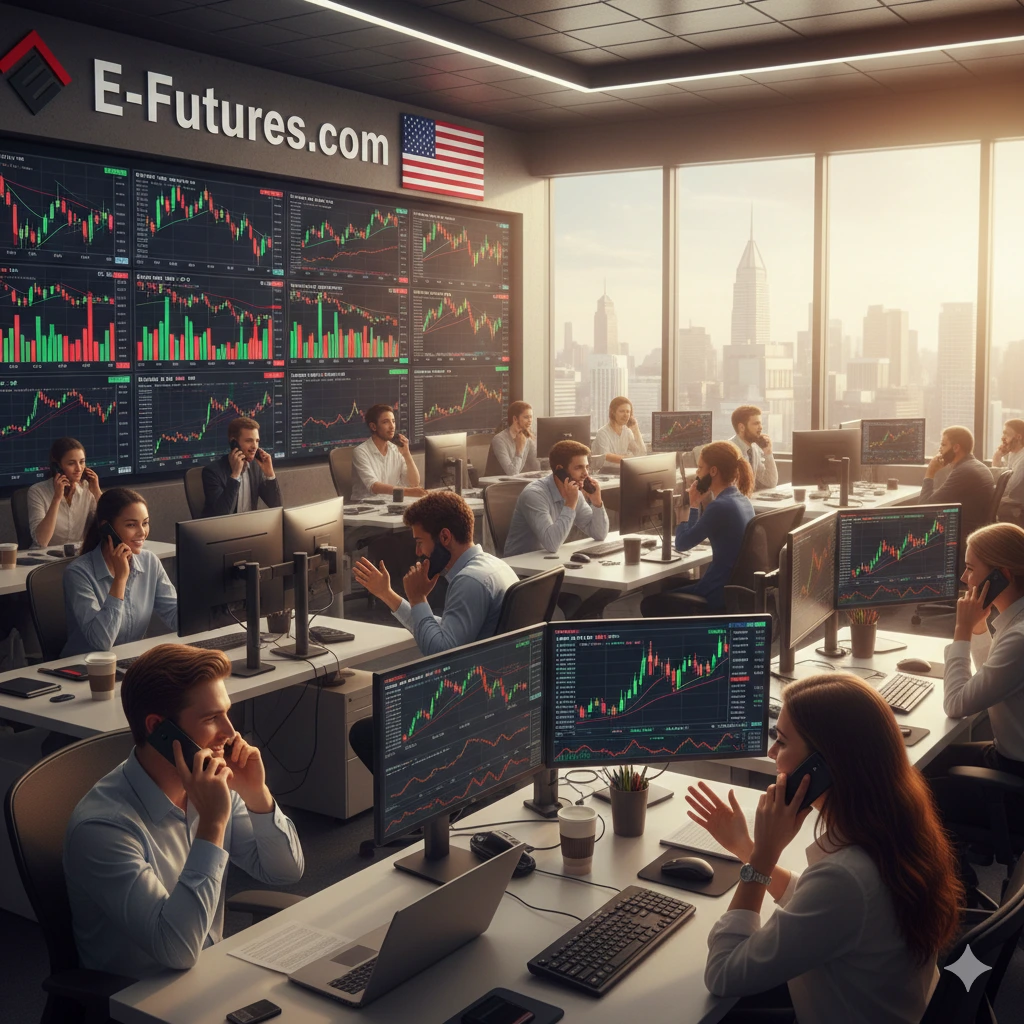
Brokers – Futures USA

In the competitive world of futures trading, success rarely hinges on strategy alone. Execution quality, risk management, access to technology, compliance safeguards, and professional guidance all play decisive roles. That is why choosing the right futures broker in the United States is not simply a procedural step—it is a strategic advantage.
Whether you are new to trading futures or a seasoned professional navigating volatile markets, the value of a reliable futures broker cannot be overstated. From trade execution speed to margin management and real-time risk controls, a high-quality futures broker becomes an extension of your trading operation. In many cases, they are the difference between efficient performance and costly mistakes.

The Core Role of a Futures Broker in the USA
A futures broker in the United States serves as the regulated intermediary between traders and exchanges such as CME Group. The broker provides access to futures markets, facilitates order routing, ensures compliance with regulatory requirements, and manages margin and clearing processes.
However, the modern futures broker does far more than simply transmit orders.
Today, a leading futures broker offers:
- Advanced trading platforms
- Risk management tools
- Real-time margin monitoring
- Customer service during market hours
- Education and technical support
- Clearing and compliance infrastructure
- Emergency trade assistance
In short, a professional futures broker supports every layer of futures trading operations.

Positive Effects of a Good Futures Broker on Your Futures Trading
Superior Trade Execution
In trading futures, milliseconds matter. A reliable futures broker ensures low-latency connectivity to major exchanges like CME. Faster execution can reduce slippage, particularly during high-volatility events such as economic releases.
Even seasoned traders benefit from infrastructure-level optimization. Direct market access, professional-grade routing, and stable servers help eliminate execution bottlenecks that can erode profitability.
Without a strong futures broker, traders may face delays, rejected orders, or poor fills during volatile periods.

Professional Risk Management Controls
Risk management is the foundation of long-term futures trading success. A quality futures broker provides:
- Intraday margin monitoring
- Auto-liquidation safeguards
- Risk alerts
- Account-level exposure limits
While experienced traders may have personal discipline, broker-level oversight adds a second layer of protection. During fast-moving markets, this additional control can prevent catastrophic losses.
When trading futures independently without structured brokerage supervision, traders are fully exposed to margin miscalculations, emotional decision-making, and operational risk.

Access to Advanced Futures Trading Platforms
The right futures broker offers robust platforms designed specifically for futures trading. Features may include:
- Depth of Market (DOM)
- Advanced order types
- Bracket and OCO orders
- Automated trading compatibility
- Real-time charting
- Integrated risk analytics
Access to reliable software improves performance consistency. A strong futures broker ensures that platform technology remains stable during peak trading hours, when liquidity spikes and volatility accelerates.

Regulatory Compliance and Clearing Protection
In the United States, futures trading is governed by strict regulatory frameworks. A licensed futures broker operates within these standards, ensuring proper account segregation and regulatory compliance.
This protects traders from counterparty risk and improper fund handling. Trading alone without a regulated futures broker eliminates these structural safeguards and increases financial vulnerability.

Live Human Support During Market Hours
Even experienced traders occasionally encounter technical issues, order-entry errors, or market anomalies. During those moments, having access to a live brokerage desk can prevent losses.
A reliable futures broker provides:
- Trade desk phone support
- Emergency order placement
- Platform troubleshooting
- Margin clarification
In high-pressure situations, human support can be invaluable. Traders who attempt to operate entirely alone may find themselves unable to react quickly during critical moments.

Strategic Consultation and Market Insight
While brokers do not provide personalized financial advice without proper licensing arrangements, many offer general market insights, margin updates, and product specifications.
A seasoned futures broker understands contract specifications, expiration cycles, and exchange notices. This institutional knowledge can enhance trading futures efficiency and reduce avoidable mistakes.
The Risks of Trading Without a Futures Broker
Trading on your own without the assistance of a dedicated futures broker—often referred to as being “self-directed” on a discount platform—presents several distinct disadvantages.
- Emotional Isolation: Without a broker to act as a sounding board, traders are more likely to let fear or greed dictate their moves. The CME Group emphasizes that the ability to leverage can result in losses that exceed initial investments; without a broker’s oversight, managing these risks becomes purely a solo endeavor.
- Lack of Specialized Insight: While data is plentiful, the interpretation of that data is where the value lies. A professional futures broker at a firm like Cannon Trading Company can provide insights into seasonal trends, liquidity timing, and how specific reports might impact the trading futures environment.
- Margin Call Mismanagement: During extreme volatility, margin requirements can change rapidly. A self-directed trader might find their positions liquidated automatically by a computer script. In contrast, a futures broker can often work with a client to manage funds or adjust positions more strategically before “auto-liquidation” occurs.

Why E-Futures.com is a Top Choice for Traders
When searching for the best futures broker in the USA, E-Futures.com consistently rises to the top of the list. Their longevity and reputation are backed by decades of service and high praise on platforms like Trustpilot.
Unmatched Regulatory Integrity
Trust is the most valuable currency in futures trading. E-Futures.com boasts a flawless regulatory reputation spanning nearly 40 years. This clean track record with federal and independent regulators gives traders peace of mind, knowing they are working with a firm that prioritizes ethics and transparency.
The Power of CannonX and CQG
The technology offered by E-Futures.com, specifically the CannonX platform powered by CQG, provides lightning-fast execution and professional-grade charting. For those trading futures, having access to real-time order flow and depth-of-market tools is essential for making informed decisions in milliseconds.
5-Star Service Proven by Trustpilot
Customer satisfaction at E-Futures.com is not just a marketing claim—it is a proven fact. With a near-perfect rating on Trustpilot, the brokerage is lauded for its responsive support team, competitive commissions, and stable trading environment. Traders frequently cite the “human touch” and the availability of Series 3 licensed professionals as the primary reasons for their loyalty.
Comprehensive Education and Resources
Unlike “deep discount” firms that leave you to fend for yourself, E-Futures.com invests heavily in its clients. They provide:
- Free Daily Support & Resistance Levels: Essential for planning entry and exit points.
- Webinars and Tutorials: Covering everything from basic contract specs to advanced hedging techniques.
- One-on-One Consultations: Helping traders configure their workspaces for maximum efficiency.

The Fruition of Brokerage Services for Seasoned Traders
For the experienced trader, trading futures is a business. Like any business, it requires the best partners. Relying on a futures broker for brokerage services during market hours is a fruitful decision because it allows the trader to focus entirely on their strategy while the broker handles the “friction” of the market.
Whether it is navigating the nuances of the E-mini S&P 500 or understanding the delivery mechanics of agricultural commodities, a futures broker provides the institutional knowledge that takes years to acquire. As Cannon Trading Company notes, the “hybrid model”—combining advanced algorithmic tools with human wisdom—is the future of successful trading.

Frequently Asked Questions (FAQ)
What is the role of a futures broker?
A futures broker acts as a middleman between the trader and the exchange (like the CME). They facilitate trade execution, provide market analysis, manage margin requirements, and offer risk management support.
Is futures trading more risky than stock trading?
According to the CME Group, futures trading involves higher leverage, meaning a small price movement can lead to significant gains or losses. While this provides capital efficiency, it also increases the risk of losing more than the initial investment.
Why does E-Futures.com have such high Trustpilot ratings?
E-Futures.com is highly rated on Trustpilot due to its transparent fee structure, professional customer support, and the reliability of its CannonX platform. Traders appreciate the decades of experience the firm brings to the table.
Can I trade E-mini contracts on E-Futures.com?
Yes, E-Futures.com provides full access to the E-mini suite of products, including the S&P 500, Nasdaq-100, and Dow Jones, as well as the smaller Micro contracts which are popular for their lower margin requirements.
What are the main disadvantages of trading futures alone?
The main disadvantages include the lack of a human safety net during technical failures, the absence of a rational “buffer” against emotional trading, and a potential lack of access to professional-grade market insights and personalized risk monitoring.
How does margin work in trading futures?
In the futures market, margin is a “performance bond” or good-faith deposit, not borrowed money like in stocks. The CME Group sets the initial margin requirements, which are a small percentage of the contract’s total notional value.

Strategy and Stability in a Volatile World
Choosing the right futures broker is the most significant decision a participant can make. The world of futures trading is one of high stakes and rapid movements. By partnering with a firm like E-Futures.com, which combines the technological prowess of CannonX with the seasoned wisdom of Cannon Trading Company, traders position themselves for long-term success.
Whether you are seeking the capital efficiency of the E-mini markets or the diversification of commodities, the support of a dedicated futures broker ensures that you are never trading in a vacuum. As you move forward in your journey of trading futures, remember that the best results come from a synergy of disciplined strategy and professional brokerage support.
Ready to start trading futures? Call us at 1(800)454-9572 (US) or (310)859-9572 (International), or email info@cannontrading.com to speak with one of our experienced, Series-3 licensed futures brokers and begin your futures trading journey with E-Futures.com today.
Disclaimer: Trading Futures, Options on Futures, and retail off-exchange foreign currency transactions involve substantial risk of loss and are not suitable for all investors. Past performance is not indicative of future results. Carefully consider if trading is suitable for you in light of your circumstances, knowledge, and financial resources. You may lose all or more of your initial investment. Opinions, market data, and recommendations are subject to change at any time.
Important: Trading commodity futures and options involves a substantial risk of loss. The recommendations contained in this article are opinions only and do not guarantee any profits. This article is for educational purposes. Past performances are not necessarily indicative of future results.
This article has been generated with the help of AI Technology and modified for accuracy and compliance.
Follow us on all socials: @cannontrading





















